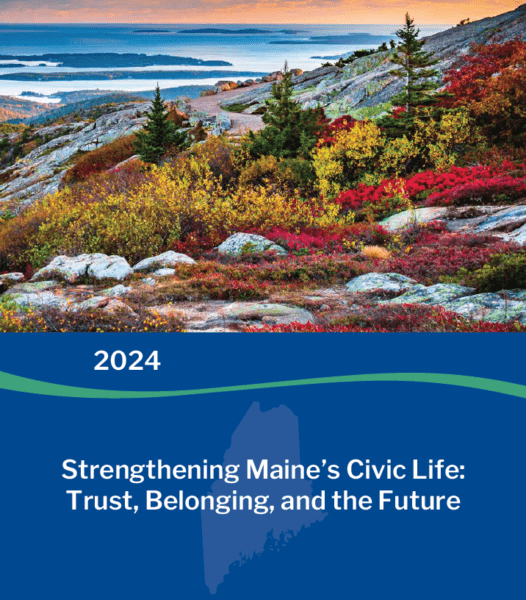At Maine Community Foundation Maine's civic health, life and engagement is fundamental to building a better Maine. The foundation's own statewide needs assessment made it clear that strong civic health and institutions are an essential prerequisite to working together and addressing any and all areas of critical importance, such as climate resilience, affordable housing, economic opportunity and equity.
In October 2024, the Goldfarb Center for Public Affairs at Colby College, in partnership with Public Engagement Partners and MaineCF, released Strengthening Maine’s Civic Life: Trust, Belonging, and the Future, a survey of 1,000 Maine residents and Census data analysis that reveals how Mainers feel about a wide range of issues, including trust in government, presidential vote counting, and the future of Maine.
"Strong civic health is an essential prerequisite for our ability to work together to address challenges like climate resilience, affordable housing and economic opportunity."
-Maine Community Foundation CEO Deborah Ellwood
Major Findings
- Hope for the Future: While a healthy 70% of Mainers are hopeful about the state’s future most Mainers are pessimistic about the future of Maine’s children, with majorities believing that they will have to leave home in order to find economic opportunity and security, and that they are unlikely to have a better life than their parents. Additionally, Mainers are pessimistic about the future of the nation and of democracy itself.
- Trust In Government: Mainers’ trust in government diminishes as attention shifts from the local level (trust in government to “almost always or mostly” to “do what is right” is at 51%) to the state level (trust drops to 37%) to the national level of government (trust nosedives to 17%). Trust in other people is fairly consistent between the local (59%) and state (55%) levels, then drops to 30% for Americans nationwide.
- New Arrivals: While Mainers are ambivalent about the influx of new people coming to their state, most feel either positive (53%) or neutral (34%) about more racially and culturally diverse people coming to their communities. Additionally, a majority of Mainers (6 out of 10) from all demographic backgrounds feel that finding common ground for solutions to today’s problems remains achievable, despite our differences.
- Voting: Maine is a national leader in terms of participation in national or local elections. However, about 30% to 40% of Mainers are not participating in most elections; citizens have mixed feelings on the benefits of ranked choice voting, and about a third of Mainers lack confidence that the 2024 presidential election will be properly counted, albeit a strong majority believe there won’t be any problems.
- Civic Participation and Awareness: Relative to other states, Mainers exhibit numerous strengths on these themes, ranking first in the nation in public meeting attendance, fourth in interacting with public officials, sixth in discussing important issues with friends and family and neighbors, and tenth in paying attention to the news.
- The State of Civic Knowledge: Six in ten residents feel they know whom to reach out to regarding issues and ideas for their community, and almost as many (56%) feel they have that same knowledge in relation to the state as a whole. At the same time, less than half of Mainers know at least one member of their local select/city board.
“Maine Community Foundation was proud to be the primary sponsor of this important research into Maine’s civic health,” said Maine Community Foundation CEO Deborah Ellwood. “Our own recent statewide Needs Assessment showed that strong civic health is an essential prerequisite for our ability work together to address challenges like climate resilience, affordable housing and economic opportunity. Congratulations to Colby College’s Goldfarb Center for Public Affairs for an important contribution to Maine.”






